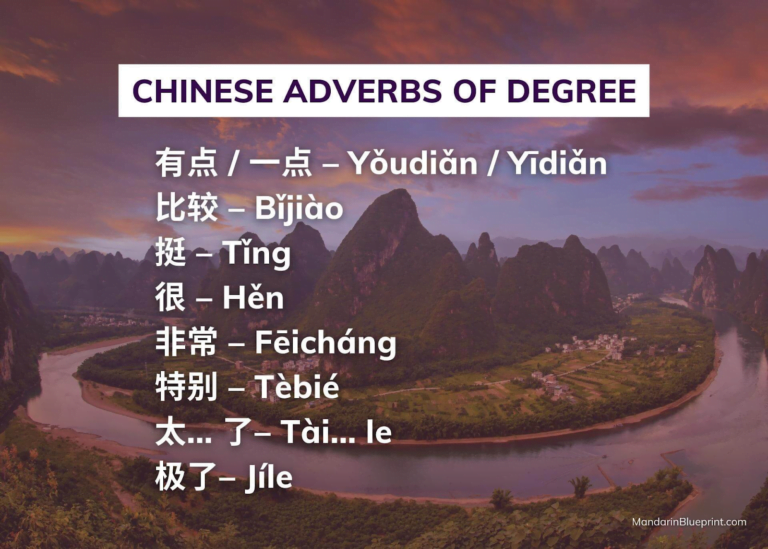Your Guide to Chinese Adverbs of Degree

Adverbs of degree, known as “程度副词” (chéngdù fùcí) in Mandarin Chinese, are fundamental in articulating the intensity or degree of actions, conditions, or qualities in a sentence. These adverbs are extremely versatile and capable of modifying verbs, adjectives, and even other adverbs, providing critical insights into the extent or level at which something is occurring or is being experienced.
In Mandarin, the impact of adverbs of degree extends beyond mere word choice. It intertwines with the nuances of the speaker’s tone and the contextual backdrop of the conversation. This intricate balance of language elements makes understanding and using these adverbs a linguistic challenge and an opportunity for deeper cultural immersion.
As we explore these adverbs further, you’ll discover how they enrich Mandarin by adding layers of meaning and emotion to the spoken and written word. They’re not just grammatical tools but windows into the expressive capabilities of the Chinese language, reflecting the subtle art of communication in Mandarin.
What follows next is an exploration of various examples of Chinese adverbs of degree, demonstrating their use and the nuances they bring to the language.

有点 / 一点 – Yǒudiǎn / Yīdiǎn
Both “有点” (yǒudiǎn) and “一点” (yīdiǎn) are commonly used Mandarin Chinese adverbs of degree that convey the idea of “a little” or “a little bit.” However, the nuances and usage of these two adverbs differ, particularly in how they’re placed within sentences and the connotations they carry.
When “有点” is placed before an adjective, it often implies a sense of mild complaint or dissatisfaction. For example, “我白天肚子有点疼” (Wǒ báitiān dùzi yǒudiǎn téng) translates to “My stomach was hurting a bit during the day.” In this context, “有点” suggests some discomfort, but it may be perceived as a slightly negative or undesirable situation.
On the other hand, “一点” is typically placed after adjectives and can be used for making comparisons or polite requests. For instance, “老板,这个包可以便宜点吗?” (Lǎobǎn, zhège bāo kěyǐ piányí diǎn ma?) means “Boss, can you make this bag a little cheaper?” Here, “一点” is used to ask for a small reduction in price, and it can be shortened to just “点” (diǎn) for convenience.
While both “有点” and “一点” can be used to express a small degree or amount, “有点” may carry a sense of complaint or dissatisfaction when placed before adjectives, whereas “一点” is more commonly used to make comparisons or polite requests when placed after adjectives. Understanding the context and the intended tone of the sentence is crucial in choosing the appropriate adverb between these two.
Related Reading: Comparisons in Chinese – A Comprehensive Guide
比较 – Bǐjiào
The phrase “比较” (bǐjiào) is a versatile term in Mandarin Chinese that serves both as a verb and an adverb. It’s commonly used to compare two or more nouns, and it can also function as an adverb to indicate a degree of comparison, typically conveying meanings such as “relatively,” “rather,” or “fairly.”
As a verb, “比较” is employed when you want to compare two or more items or situations. For example, “她学外语比较快” (Tā xué wàiyǔ bǐjiào kuài) means “She learns foreign languages relatively quickly.” In this context, “比较” introduces a comparison between her language learning speed and that of others.
When used as an adverb, “比较” modifies adjectives or verbs to indicate a degree of comparison or to express a relative level of a certain quality or condition. For instance, “我今天感觉比较累” (Wǒ jīntiān gǎnjué bǐjiào lèi) translates to “I feel rather tired today.” Here, “比较” emphasizes that the speaker feels more tired than usual or in comparison to a previous state.
比较 is a versatile term in Mandarin Chinese that facilitates comparisons between nouns and also functions as an adverb to convey degrees of comparison or relative qualities. Its usage depends on the context and the specific information you want to convey within a sentence.
挺 – Tǐng

The Chinese adverb “挺” (tǐng) is a common term in everyday Mandarin speech and is often used to convey the meaning of “quite” or “pretty.” It’s utilized to describe the degree or intensity of an adjective, typically indicating that something possesses a considerable or noteworthy level of a particular quality. In the context of sentences, it serves to emphasize the speaker’s opinion or observation.
For example, in the sentence “罗老师的课是挺好玩的” (Luō lǎoshī de kè shì tǐng hǎowán de), “挺” is used to express that Mr. Luo’s lessons are quite enjoyable or pretty fun. It adds a layer of emphasis to the adjective “好玩” (hǎowán), which means “fun” or “interesting,” indicating that the speaker finds the lessons to be more enjoyable than expected.
“挺” is one of the more versatile Chinese adverbs of degree that can be applied to various adjectives to highlight which quality or condition is present. It helps to provide a nuanced description and adds emphasis to the speaker’s assessment or judgment of a situation or object.
Related Reading: Saying “I Would Like” in Chinese
很 – Hěn
The Chinese adverb “很” (hěn) is a versatile word that’s commonly used to modify adjectives and verbs to convey degrees of intensity or emphasis. Its usage can vary depending on the context in which it’s employed.
When used to connect a noun and an adjective, “很” can serve two primary purposes. It can mean “is very” or simply “is.” For example, the sentence “我的嘴很干” (Wǒ de zuǐ hěn gàn) can be interpreted as “My mouth is dry” or “My mouth is very dry.” The degree of intensity conveyed by “很” is neutral, and its interpretation depends on the speaker’s tone and context.
In the case of verbs related to emotions, such as “爱” (ài, “to love”), “很” always intensifies the verb. For instance, “我爱你” (Wǒ ài nǐ) means “I love you,” while “我很爱你” (Wǒ hěn ài nǐ) means “I love you very much.” In this context, “很” emphasizes the depth or intensity of the emotion expressed by the verb.
Overall, “很” is one of the most valuable Chinese adverbs of degree that allows Mandarin speakers to modify both adjectives and verbs to convey varying degrees of intensity, making it an essential tool for expressing emotions, descriptions, and opinions in the language.
非常 – Fēicháng

The adverb “非常” (fēicháng) is a common and versatile word in Mandarin Chinese that’s used to intensify adjectives and convey a high degree of emphasis or intensity. While its literal meaning is “not-ordinary” or “extraordinary,” it’s most commonly translated into English as “very” or “really.”
“非常” adds a strong emphasis to the adjective it modifies, making it a powerful tool for expressing intensity or strong feelings.
In the sentence “中国菜非常好吃” (Zhōngguócài fēicháng hǎochī), which translates to “Chinese food is very delicious,” the adverb ‘非常’ (fēicháng) intensifies the adjective ‘好吃’ (hǎochī, ‘delicious’). The inclusion of ‘非常’ in this context not only emphasizes the adjective but also conveys a higher degree of deliciousness, suggesting that Chinese food isn’t just tasty but exceptionally so.
“非常” can be applied to various adjectives to express a wide range of intensities, from mild to extremely strong. It allows Mandarin speakers to convey their enthusiasm, satisfaction, or strong opinions about a particular quality or attribute. Whether describing food, a person’s qualities, or an experience, “非常” is one of the most valuable Chinese adverbs of degree when it comes to adding emphasis and intensity to the language.
Related Reading: How to Order Chinese Food in a Chinese Restaurant
特别 – Tèbié
The word “特别” (tèbié) is an extremely versatile term in Mandarin Chinese that can function both as an adjective and an adverb, conveying the meaning of “special” or “especially.” When used as an adjective, it describes something as unique, exceptional, or out of the ordinary. For example, “特别的礼物” (tèbié de lǐwù) translates to “a special gift,” indicating that the gift holds a unique or significant place.
However, it’s when “特别” is employed as an adverb that it adds a valuable layer of emphasis to a statement. In this context, it signifies that something is particularly noteworthy or stands out distinctively. For instance, the phrase “中国菜特别好吃” (Zhōngguó cài tèbié hǎochī) means “Chinese food is especially delicious.” Here, “特别” intensifies the adjective “好吃” (hǎochī), emphasizing the exceptional taste of Chinese cuisine.
In daily conversation, Mandarin speakers use “特别” to emphasize their admiration, approval, or satisfaction with a particular attribute, quality, or experience. It serves as a powerful tool to highlight what makes something unique or outstanding. Whether it’s praising the taste of food, the kindness of a person, or the beauty of a place, “特别” helps express a high degree of appreciation and admiration.
太… 了– Tài… le

The Chinese structure “太… 了” (tài… le) is a great expression used to intensify adjectives and convey a strong degree of emphasis. It’s commonly employed in both positive and negative contexts to emphasize the extremeness of a situation or quality.
When used to describe something negatively, “太… 了” implies that the degree of the adjective is excessive or undesirable. For instance, in the sentence “今天太热了” (Jīntiān tài rè le), “太热” (tài rè) means “too hot,” emphasizing that the weather is excessively hot, to the point where it becomes uncomfortable. This structure is often used to express complaints or dissatisfaction.
Conversely, in a positive context, “太… 了” highlights the exceptionally positive or desirable nature of something. For example, “她今天看起来太漂亮了” (Tā jīntiān kànqǐlái tài piàoliang le) means “She looks so beautiful today.” Here, “太漂亮” (tài piàoliang) emphasizes how exceptionally pretty the woman looks on that particular day.
Essentially, “太… 了” allows Mandarin speakers to express a strong degree of sentiment, whether it’s admiration, approval, dissatisfaction, or discomfort. It’s an incredibly useful tool for adding emphasis to descriptions and opinions, making the speaker’s feelings more pronounced in the conversation.
Related Reading: 11 Words for “Beautiful” in Chinese
极了– Jíle
The Chinese adverb 极了 (jíle) is used to convey a sense of extremeness or intensity in a similar way to the word “extremely” in English. It’s often placed after an adjective to emphasize the degree or extent of that adjective.
The character 极 (jí) itself means “the utmost point” or “extreme,” and when combined with 了 (le), it intensifies the adjective that precedes it. This intensification adds emphasis to the adjective and conveys a strong sense of extremeness or intensity.
For example, in the sentence “我最近忙极了” (Wǒ zuìjìn máng jíle), 极了 (jíle) is used to emphasize the intensity of being busy. It translates to “I’ve been extremely busy recently,” highlighting the high level of busyness.
Similarly, in the sentence “这所学校的汉语课难极了” (Zhèsuǒ xuéxiào de hànyǔ kè nán jíle), 极了 (jíle) intensifies the adjective 难 (nán), meaning “difficult.” It translates to “The Mandarin language lessons at this school are extremely difficult,” emphasizing the challenging nature of the courses.
So, 极了 (jíle) is a versatile adverb that allows Mandarin speakers to emphasize the extremeness or intensity of various qualities, situations, or actions, making their descriptions more vivid and impactful in conversation.
Mastering the Art of Chinese Adverbs of Degree
Mastering Chinese adverbs of degree requires practice and a keen understanding of their contextual and tonal nuances. They are not just linguistic tools but also cultural ones, reflecting the rich subtleties of Mandarin Chinese. By incorporating these adverbs thoughtfully into speech and writing, learners can significantly enhance their ability to communicate effectively and expressively in Mandarin.
As we finish our exploration of Chinese adverbs of degree, remember the profound impact these small yet mighty words have on the Mandarin language. They’re not just linguistic ornaments, they’re essential tools that bring precision, emotion, and clarity to your communication. Whether you’re a beginner or an advanced learner, mastering these adverbs can significantly enhance your ability to express nuances and understand the subtleties of Mandarin.
The question then is, are you trying to learn Mandarin more efficiently and effectively? Have you ever wondered how close you are to fluency or what steps you should take next on your language-learning journey?
Imagine having a clear, personalized roadmap that guides you towards Mandarin mastery, tailored specifically to your current abilities and goals. That’s precisely what our FREE Mandarin Fluency Scorecard offers. This unique tool provides a comprehensive assessment of your current Chinese skills, pinpointing your strengths and areas for improvement.
With our Mandarin Fluency Scorecard, you won’t just identify your personal weaknesses and barriers to fluency, you’ll also discover the most effective next steps based on your current level. Imagine the satisfaction and confidence you’ll feel as you progress, equipped with a custom report filled with immediate action steps, all designed to streamline your learning process.
Don’t miss this opportunity to accelerate your Mandarin learning journey. Complete the FREE Mandarin Fluency Scorecard now and get your customized guide to fluency in under a minute! It’s quick, easy, and entirely free. Take the first step towards Mandarin mastery today – it takes less than 60 seconds!
Embrace the nuances of Mandarin and watch as your language skills transform. Let’s travel on this journey to fluency together.








